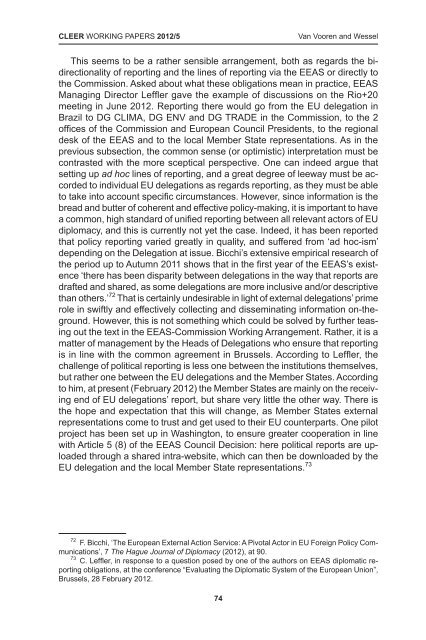Principles and practices of EU external representation - TMC Asser ...
Principles and practices of EU external representation - TMC Asser ...
Principles and practices of EU external representation - TMC Asser ...
You also want an ePaper? Increase the reach of your titles
YUMPU automatically turns print PDFs into web optimized ePapers that Google loves.
CLEER WORKING PAPERS 2012/5<br />
Van Vooren <strong>and</strong> Wessel<br />
This seems to be a rather sensible arrangement, both as regards the bidirectionality<br />
<strong>of</strong> reporting <strong>and</strong> the lines <strong>of</strong> reporting via the EEAS or directly to<br />
the Commission. Asked about what these obligations mean in practice, EEAS<br />
Managing Director Leffler gave the example <strong>of</strong> discussions on the Rio+20<br />
meeting in June 2012. Reporting there would go from the <strong>EU</strong> delegation in<br />
Brazil to DG CLIMA, DG ENV <strong>and</strong> DG TRADE in the Commission, to the 2<br />
<strong>of</strong>fices <strong>of</strong> the Commission <strong>and</strong> European Council Presidents, to the regional<br />
desk <strong>of</strong> the EEAS <strong>and</strong> to the local Member State <strong>representation</strong>s. As in the<br />
previous subsection, the common sense (or optimistic) interpretation must be<br />
contrasted with the more sceptical perspective. One can indeed argue that<br />
setting up ad hoc lines <strong>of</strong> reporting, <strong>and</strong> a great degree <strong>of</strong> leeway must be accorded<br />
to individual <strong>EU</strong> delegations as regards reporting, as they must be able<br />
to take into account specific circumstances. However, since information is the<br />
bread <strong>and</strong> butter <strong>of</strong> coherent <strong>and</strong> effective policy-making, it is important to have<br />
a common, high st<strong>and</strong>ard <strong>of</strong> unified reporting between all relevant actors <strong>of</strong> <strong>EU</strong><br />
diplomacy, <strong>and</strong> this is currently not yet the case. Indeed, it has been reported<br />
that policy reporting varied greatly in quality, <strong>and</strong> suffered from ‘ad hoc-ism’<br />
depending on the Delegation at issue. Bicchi’s extensive empirical research <strong>of</strong><br />
the period up to Autumn 2011 shows that in the first year <strong>of</strong> the EEAS’s existence<br />
‘there has been disparity between delegations in the way that reports are<br />
drafted <strong>and</strong> shared, as some delegations are more inclusive <strong>and</strong>/or descriptive<br />
than others.’ 72 That is certainly undesirable in light <strong>of</strong> <strong>external</strong> delegations’ prime<br />
role in swiftly <strong>and</strong> effectively collecting <strong>and</strong> disseminating information on-theground.<br />
However, this is not something which could be solved by further teasing<br />
out the text in the EEAS-Commission Working Arrangement. Rather, it is a<br />
matter <strong>of</strong> management by the Heads <strong>of</strong> Delegations who ensure that reporting<br />
is in line with the common agreement in Brussels. According to Leffler, the<br />
challenge <strong>of</strong> political reporting is less one between the institutions themselves,<br />
but rather one between the <strong>EU</strong> delegations <strong>and</strong> the Member States. According<br />
to him, at present (February 2012) the Member States are mainly on the receiving<br />
end <strong>of</strong> <strong>EU</strong> delegations’ report, but share very little the other way. There is<br />
the hope <strong>and</strong> expectation that this will change, as Member States <strong>external</strong><br />
<strong>representation</strong>s come to trust <strong>and</strong> get used to their <strong>EU</strong> counterparts. One pilot<br />
project has been set up in Washington, to ensure greater cooperation in line<br />
with Article 5 (8) <strong>of</strong> the EEAS Council Decision: here political reports are uploaded<br />
through a shared intra-website, which can then be downloaded by the<br />
<strong>EU</strong> delegation <strong>and</strong> the local Member State <strong>representation</strong>s. 73<br />
72 F. Bicchi, ‘The European External Action Service: A Pivotal Actor in <strong>EU</strong> Foreign Policy Communications’,<br />
7 The Hague Journal <strong>of</strong> Diplomacy (2012), at 90.<br />
73 C. Leffler, in response to a question posed by one <strong>of</strong> the authors on EEAS diplomatic reporting<br />
obligations, at the conference “Evaluating the Diplomatic System <strong>of</strong> the European Union”,<br />
Brussels, 28 February 2012.<br />
74

















